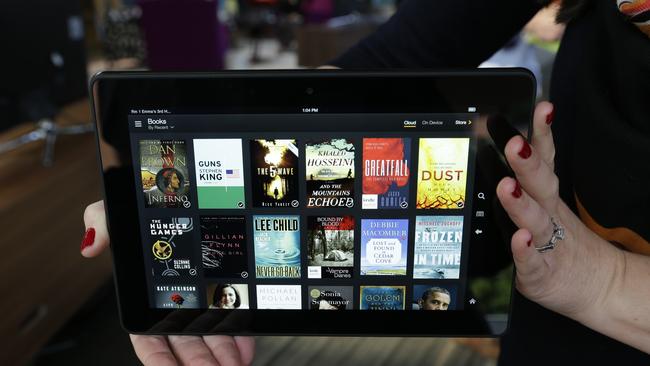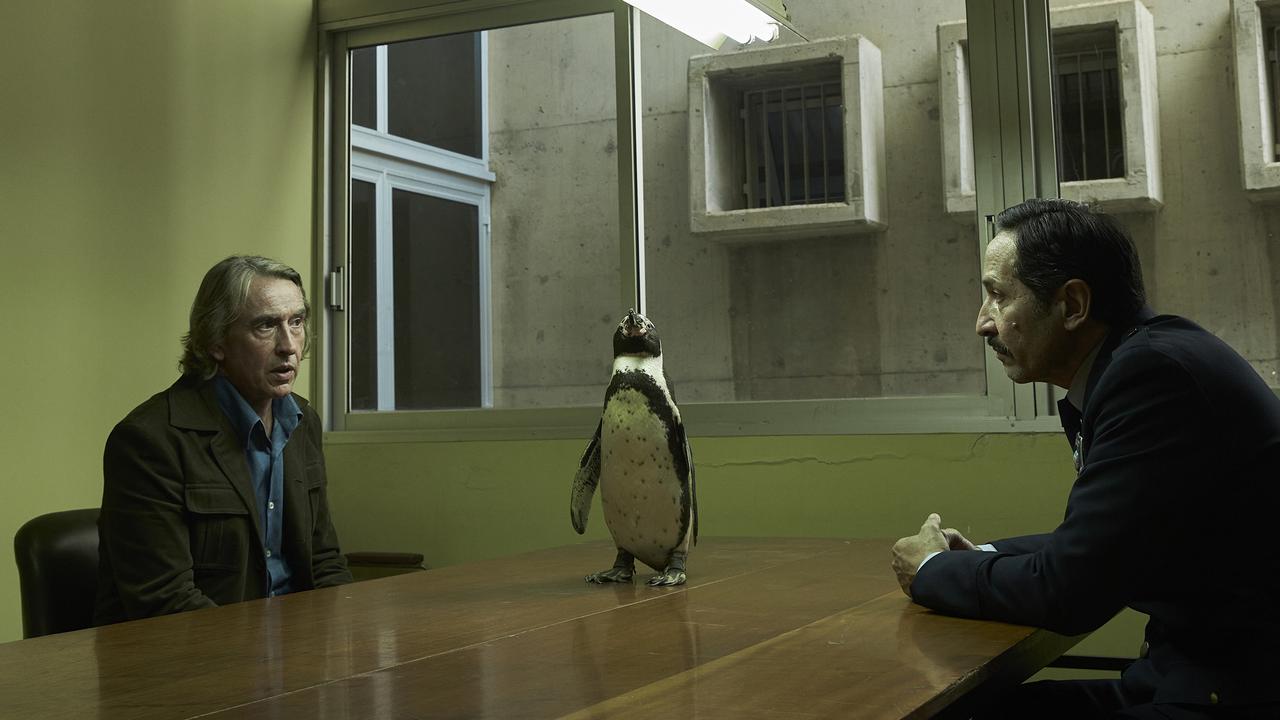Amazon and Hachette wage war of words over e-book pricing
AS Amazon’s feud with publisher Hachette drags on, the online bookseller stands accused of unfairly targeting authors.

EVEN before its official release, Perth author Brooke Davis’s debut novel was shaping up as one of the year’s literary hits. Lost and Found, a poignant meditation on living with grief, sparked an international bidding war ahead of its publication this month, and was sold to 25 countries. It is to be translated into 20 languages — a dream result for any author.
Yet Davis’s giddy debut is not being celebrated in all segments of the book trade. On Amazon’s Kindle platform, Lost and Found sells for $US12.13, but its listing comes with the negatively charged rider: “This price was set by the publisher.’’ The subtext is clear: the buyer is being denied a discount Amazon is eager to give.
In the same store, the Kindle edition of the 2014 Miles Franklin award winner, Evie Wyld’s All the Birds Singing, costs $US11.83 — just 30c less than Davis’s e-book — yet customers are told this is a certified bargain. Amazon highlights how Wyld’s e-book, published by Random House, represents a 60 per cent saving on the digital list price. No such information is given about Lost and Found, but then, this novel is published by Hachette Australia, which is party to an e-book agreement Amazon trenchantly opposes.
Known as the “agency model’’, this agreement allows publishers here, among them Penguin, Hachette and Pan Macmillan, to control the prices of Australian e-books. Such an agreement is anathema to Amazon, whose business model depends on deep discounting.
So the bookselling behemoth retaliates by selectively targeting e-books by local authors, including Tim Winton, Matthew Reilly and the emerging Davis, when their e-book prices are set by their publishers. Reilly’s new fantasy series Troll Mountain is written in short instalments or “episodes’’ that sell for $US1.87 each in the Kindle store, yet again the listing warns: “This price was set by the publisher.’’ Troll Mountain is published by a digital-only imprint of Pan Macmillan Australia, a signatory to the agency model Amazon so dislikes.
Davis’s agent, Benython Oldfield, says of Amazon singling out certain Australian authors: “Authors’ sales are surely being hurt by this ungenerous listing. I hope that this can be resolved quickly and that an equal sales pitch can be re-established for all new releases on the Kindle stores. Our authors shouldn’t be used as pawns in business disputes.’’
Yet, as we shall see, Amazon is deploying the same kind of tactics it has used against fixed-price Australian e-books on a much bigger battlefield — its epic feud in the US with French publishing multinational Hachette. This gloves-off dispute also centres on the pricing of e-books, and has implications for who controls the future of publishing — traditional publishers or the vast web retailer that flogs everything from books to pet supplies and grocery delivery services.
Mirroring the strategy it has used against fixed-price e-books, Amazon has imposed tough sanctions on Hachette authors. It has prevented the discounting of some titles on its site, removed the pre-order button for others and drastically slowed shipping times. Household-name authors published by Hachette, including JK Rowling (writing as crime novelist Robert Galbraith), James Patterson and Pulitzer Prize-winner Donna Tartt are caught in the eye of this ferocious e-commerce storm.
So is another Australian Hachette author whose debut novel was a literary success story of 2013. On Amazon, the hardback edition of Hannah Kent’s Burial Rites, about a young woman sentenced to hang in 19th-century Iceland, is being delivered at a glacial pace — its listing says it “usually ships within two to three weeks’’. Last month, Amazon provocatively removed the pre-order button for Rowling/Galbraith’s latest crime novel, The Silkworm, one of the year’s most highly anticipated releases.
Joel Becker, chief executive of the Australian Booksellers Association, says the web retailer’s practice of targeting authors because of business disputes with their publishers is highly questionable. “I wouldn’t consider it ethical practice,’’ he says, adding that “even writers who do very well off Amazon are concerned about Amazon’s market share and their business practices’’.
In the US, Amazon’s aggressive tactics have led to accusations of bullying — which Amazon denies — and have alienated authors such as John Green, who penned the muscular bestseller The Fault In Our Stars. Green has said: “What’s ultimately at stake is whether Amazon is going to be able to freely and permanently bully publishers into eventual non-existence.’’ (Green is not a Hachette author and his teen romance has been a No 1 seller on Amazon.)
Other prominent writers including Patterson, John Grisham and Geraldine Brooks have signed a group protest letter initiated by American author Douglas Preston. It said: “It is not right for Amazon to single out a group of authors, who are not involved in the dispute, for selective retaliation. Moreover, by inconveniencing and misleading its own customers with unfair pricing and delayed delivery, Amazon is contradicting its own written promise to be ‘Earth’s most customer-centric company’.”
However, self-published and Amazon-published authors who have felt snubbed by traditional publishers are backing the web retailer. Their petition has attracted 7000 signatures and it claims: “Amazon pays writers nearly six times what publishers pay us … Amazon allows every writer access to their platform. Hachette believes you’ll read whatever Hachette tells you to, and rejects and dismisses many worthy writers. Amazon has built a business based on the belief that you, the reader, can make your own choices about what you want to read. That is real freedom, of a sort readers and authors have never had before.’’
The dispute is one of the most incendiary seen in the normally genteel world of publishing, where terms-of-trade disagreements are usually negotiated behind closed doors. Earlier this month, Hachette dismissed a contentious proposal by Amazon to give Hachette authors 100 per cent of the revenue from their e-book sales while the feud plays out.
Hachette, which wasn’t consulted about this proposal, described it as “suicidal’’. Amazon shot back: “We call baloney. Hachette is part of a $10 billion global conglomerate. It wouldn’t be ‘suicide’. They can afford it.”
A division of French conglomerate Lagardere, Hachette has called on Amazon to “withdraw the sanctions they have unilaterally imposed’’, so the dispute can be resolved.
For all the heat it is generating, both parties have been reluctant to reveal the exact details of their disagreement. It’s understood Amazon is demanding lower e-book prices and a bigger slice of e-book revenue, while Hachette is resisting. To date, publishers have received the biggest cut of e-book sales (often around 70 per cent), and in a tough market for print books, they don’t want to dilute this.
Amazon says it just wants lower prices for customers — its favoured price for e-books is reportedly $US9.99. In a recent interview with The New York Times, Russell Grandinetti, Amazon’s senior vice-president for Kindle, suggested publishers were out of touch with the realities of the digital revolution. “If you charge high e-book prices, ultimately what you’re doing is making a slow, painful slide to irrelevancy,” he said. He pointed out that books now competed against everything from Facebook to free online newspapers: “It’s a new world. It’s so important not to simply build a moat around the industry.’’
Hachette responded that Amazon’s e-pricing policy is really about its bottom line. “This controversy shouldn’t be misinterpreted,” said Michael Pietsch, Hachette’s chief executive. He told the NYT: “It’s all about Amazon trying to make more money. Amazon’s margins, not lower prices for consumers, are the crux here.” (Amazon’s turnover may be huge, but its profits often aren’t, and its share price has been volatile in recent months.)
Australian e-books are partly shielded from Amazon’s aggressive discounting by the agency model, though not all local publishers have signed up to it. And Oldfield, director of the Zeitgeist literary agency, believes there are anomalies on the Kindle platform between those titles that are published under the model and those that aren’t.
He says the “this price was set by the publisher’’ rider “looks all very innocuous until you look at other titles of a very similar stature and pricepoint which are listed with attractive percentage discounts, to show the consumer that they are getting a good deal. … It looks like this is Amazon’s subtle way of saying, ‘This book which we have set the price on is a good deal’ while anything tagged ‘This price was set by the publisher’ is not such a good deal. ’’
Oldfield maintains Hachette is right to set e-book prices at levels that realistically reward authors. “The return to the individual author is so negligible from a 99c sale that it is not even worth our agency’s time doing the paperwork,’’ he says. Review put some of these criticisms to Amazon, which does not have an office in Australia, but the company did not respond.
According to Becker, Australian booksellers are “very pleased’’ Hachette is fighting Amazon’s moves to cut e-book prices, because the latter “operates on a business model where they’re prepared to sell a significant proportion of their list below cost … which I believe is an anti-competitive practice, because nobody can match and compete with that, when you take that across the list’’. Many publishers argue that Amazon’s deep discounting is unsustainable, and will drive down returns to authors and publishers alike.
In less than 20 years, Amazon has risen to become the world’s biggest online retailer and the US’s most powerful bookseller. Last week, it further rattled high-street bookshops and chains by launching a $US9.99 a month subscription service that permits customers to read as many titles as they wish from its vast storehouse of digital books.
According to some estimates, Amazon controls at least two-thirds of e-book sales and about 50 per cent of print book sales in the US. The company doesn’t release figures for its e-book sales in Australia, but it’s widely assumed it has the lion’s share of that market. (E-book sales are believed to account for 10 to 15 per cent of book sales in Australia, and about 30 per cent of total book sales in the US.)
The Hachette feud is not the only stoush in which Amazon is involved. It is wrestling with a German publisher over terms of trade, and the big publisher Simon & Schuster has reportedly just started up a fresh round of contract negotiations.
Last year, a US court found that an agreement on e-book pricing between Apple and five big publishers — which was designed to curb Amazon’s market dominance — breached antitrust laws. Apple is appealing against the decision, although the tech giant and the publishers, including HarperCollins — part of News Corp, which publishes this newspaper — have been ordered to pay hefty compensation to e-book purchasers.
That case was decisive victory for Amazon. And as the legal decision was handed down, some local e-book fans complained that under the agency model, Australia-based publishers kept the price of digital books artificially high.
Yet Jon Page, who runs the Pages and Pages bookstore in Sydney’s Mosman, believes Amazon is losing the battle for hearts and minds in its standoff with Hachette. He says that four years ago, when the online bookseller was in dispute with the publisher Macmillan over e-book prices, public sentiment lay with Amazon. “The tide has kind of turned the other way,’’ Page observes. “There’s a lot more support for Hachette from their authors and from their readers as well.’’ Why? He argues that consumers have seen book chains such as Borders collapse and are wary of Amazon turning into a monopoly.
Patterson, who has been described as a “one-man hit factory’’, believes that is already happening.
One of the biggest-selling authors of all time, he accuses Amazon of wanting to “control bookselling, book buying, and even book publishing’’ at a time when serious literature is under threat from shuttered bookshops, underfunding of libraries and publishers’ relatively low profits.
“Publishers are not terribly profitable,’’ he said in a recent speech. “If those profits are further diminished, publishers will produce less serious literature. It’s just a fact of life.’’



